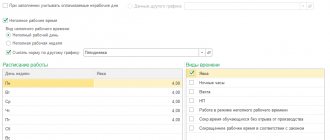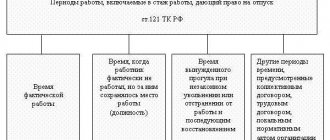Absenteeism, unfortunately, is a fairly common occurrence not only in educational institutions; it also happens in the workplace. Employers who are dissatisfied with the unjustified absence of an employee may refuse to continue to cooperate with the truant, dismissing him under the relevant article of the Labor Code. At the same time, in order for such a dismissal not to be challenged in the future, it is necessary to strictly comply with the administrative “regulations”, and most importantly, to correctly qualify absenteeism from the point of view of labor legislation.
Question: Is it legal to dismiss an employee who does not go to work during a period of downtime if the employer’s LNA does not indicate the employee’s right not to go to work during such a period? View answer
The absentee does not agree with the dismissal: can it be challenged?
Absenteeism is a violation so serious that even a single proven case is sufficient by law to dismiss the offender. After all, sometimes employee absenteeism can be fraught with serious unpleasant or even fatal consequences for the entire activity of the enterprise.
However, when dismissing on the basis of absenteeism, the employer must strive to avoid mistakes that could lead to challenging the dismissal in court. If the decision is positive, the plaintiff’s dismissal for absenteeism will be considered illegal.
Question: The employee presented the employer with a sick leave certificate for payment. When checking the authenticity of the sick leave certificate presented, it turned out that it was fake. Is it possible to fire an employee for absenteeism in this case? View answer
This entails the reinstatement of the dismissed person in his previous position with payment of salary for the entire period, from unfair dismissal to the end of the trial, and in some cases, compensation for moral damage. This, unfortunately for the employer, is possible if:
- the reason for dismissal for absenteeism was a fact that is not absenteeism as defined by legislative documents;
- the algorithm of actions during the dismissal procedure due to absenteeism was violated;
- There were errors and inaccuracies in the preparation of relevant documents.
Let's consider how to maintain accuracy in each of these points so that everything is flawless from the point of view of current legislation.
Question: An employee submitted a written application for three days of leave at his own expense in connection with the death and funeral of his brother. The General Director, who accepted the application, verbally authorized the granting of leave. However, the application does not contain a visa for the general director, and no order was issued to grant leave. The employee did not show up for work. Is an employee subject to dismissal for absenteeism? View answer
Responsibility of the employer for failure to comply with the dismissal procedure
If regulatory authorities identify violations of the dismissal procedure, the employer may be held administratively liable.
So, according to Art. 5.27 Code of Administrative Offenses of the Russian Federation for violation of labor legislation:
- A legal entity may be fined in the amount of 30,000 to 50,000 rubles; in case of repeated violation, the amount increases from 50,000 to 70,000 rubles.
- An individual entrepreneur or an official will also be punished with a fine of 1,000 to 5,000 rubles, in case of repeated violation - from 10,000 to 20,000 rubles, or disqualification for a period of 1 to 3 years (for officials).
If a dismissed employee also applies to the judicial authorities in order to challenge the legality of dismissal for absenteeism, then if such demands are satisfied, he may be reinstated at work.
Truancy through the eyes of the law
The Labor Code of the Russian Federation in subparagraph a 6 of paragraph 1 of article 81 clearly defines this disciplinary violation and describes the possible actions of the employer provided for in legislative acts.
Question: Is it possible to fire an employee for absenteeism who did not notify the organization of his absence from work in connection with participation in elections as a member of the election commission, if the election commission received a proposal from the employee 3 days after the elections? View answer
According to the Labor Code, absenteeism is an employee being outside the workplace during the working day or shift (regardless of its duration) or being absent during working hours for more than 4 hours in a row or cumulatively for a shift for reasons considered disrespectful by the employer.
NOTE! Exactly 4 hours of absence is not absenteeism! Lunch break is not included in the time calculation.
Question: Can an organization fire an employee for absenteeism if, when transferred to remote work, but in the absence of a written agreement for the transfer, the employee does not appear in the office, considering the terms of the employment contract to be changed? View answer
How many days (hours) in advance can an employee be fired under an article, can they be fired in one day?
Absence from work without a good reason can be a one-time violation or occur systematically. According to Art. 81 of the Labor Code of the Russian Federation, it is permissible to fire an employee even for one absence. A prerequisite for this is the absence of the employee from the place of work for more than 4 hours in a row without a valid reason. Otherwise, termination of the contract is considered illegal.
Judicial practice provides clarifications, indicating the reasons that serve as the basis for the dismissal of an employee (clause 39 of the resolution of the Plenum of the Armed Forces of the Russian Federation No. 2 of March 17, 2004):
- missing work for the entire day (shift), regardless of its duration;
- staying outside the workplace for more than 4 hours in a row during the day (shift);
- leaving the job of a person operating under an open-ended contract without warning the employer of dismissal and before the end of the notification period specified by law (Article 80 of the Labor Code of the Russian Federation);
- leaving the job of a citizen with whom a fixed-term employment contract has been concluded before the end of its validity period or the period for informing about termination of the contract (Article 79 of the Labor Code of the Russian Federation);
- unauthorized use of vacation days or days off.
Attention! In addition to dismissal, other penalties for absenteeism are possible: reprimand, reprimand (Article 192 of the Labor Code of the Russian Federation).
In this case, it is permissible to apply only one punishment. For example, if an employee is reprimanded for missing work, management no longer has the right to fire him. How many reprimands or reprimands are enough to dismiss an employee is described here.
When choosing a punishment, it is necessary to take into account the severity of the offense and the circumstances surrounding it. To dismiss an employee, proper registration and official confirmation of the fact of violation of discipline are required.
The grounds for dismissal under the article and the procedure for this procedure can be found here.
What else will be considered absenteeism?
The legislation also includes absenteeism as absenteeism in the following cases:
- unauthorized termination of work before the expiration of the employment contract;
- time off that was not agreed upon with management (the employee’s right to rest for reasons provided for by law, for example, after donating blood, is not considered time off);
- did not work the required two weeks after submitting the resignation letter (or 3 days if the outgoing employee is on a probationary period);
- unauthorized departure on vacation not included in the schedule.
ATTENTION! If the employer has not provided the leave required by law, the time of which is not left at his discretion, then even unauthorized rest in this case cannot be considered absenteeism.
The procedure for registering the dismissal of pensioners at their own request
Of which, the first is given to the HR department, the second, with a mark of acceptance, remains with the employee. IMPORTANT: If a manager requires an employee to present a pension certificate to confirm his pensioner status, his actions are unlawful. The employer is obliged to release the pensioner according to his wishes. Restrictions are imposed only on dismissal, which is carried out at the initiative of employers.
The order must indicate the responsible persons.
Usually they are the head of the personnel department and the chief accountant. In addition, the document must have at least two signatures:
- the leader giving the order;
- the dismissed employee, after he has read the text.
The latter is necessary to confirm the pensioner’s consent to dismissal. If an older employee is transferred to an easier job, the order is issued in form T-5.
What reason for absence will be approved?
The Labor Code does not provide a list of valid reasons for absence from work; usually these are considered to be events supported by documentary evidence. In the event of an appeal against dismissal, the court will not consider the following to be absenteeism:
- temporary loss of ability to work due to health reasons - a certificate from the treating organization is required;
- emergency situations (natural disasters, communal troubles, misfortune that happened to loved ones);
- transport problems (disruption of public transport, flight delays or cancellations, etc.) - it is better to obtain a certificate from the transport company;
- performance during working hours of public or state duties provided for in Art. 170 Labor Code of the Russian Federation;
- donation;
- strike of company employees;
- the employee being in custody;
- absenteeism from work overtime;
- disagreement to interrupt a planned vacation;
- absence from performing activities prohibited to the employee for medical reasons;
- refusal to transfer to work in another location.
IMPORTANT INFORMATION ! If an enterprise delays employees’ salaries for more than 15 days, then employees can suspend work activities by notifying their superiors in writing, and this cannot be regarded as absenteeism.
If the manager voluntarily released the employee at his request, of course, his absence is not absenteeism. But if the boss wants to fire a person for some reason, he may take advantage of this situation in bad faith if permission to leave the job was given privately. If the employee is not on the best terms with the employer, then in such circumstances it is better to record the permission in writing or talk to the manager in the presence of several people.
How to properly fire a truant worker
If the employer has decided to fire, and not to use other measures of influence permitted by law on the absentee employee (reprimand, deprivation of bonus, etc.), then he must adhere to the procedure prescribed by Art. 193 Labor Code of the Russian Federation.
Step-by-step algorithm for the employer:
- Documentary recording of absenteeism by an act of absence from the workplace with signatures of witnesses or a memo in which the immediate supervisor notifies the superior about the absence of his subordinate from the workplace.
- Requiring an explanatory note from a potential truant. It must be submitted within 2 days, otherwise the reason for absence will be considered unsatisfactory. If such a note is not received, an act of refusal of the employee to explain is drawn up.
- Issuance of an order for the enterprise on dismissal according to subclause a, clause 6, part 1, article 81 of the Labor Code of the Russian Federation (form T-8, T-8a).
- Familiarization of the dismissed employee with the order against signature within 3 days, drawing up a report in case of refusal to sign.
- Making a corresponding entry in the work book and handing it over to the person being dismissed. If an employee does not show up for a work book, he is sent a notice of this possibility (by a notification letter or by courier to the address specified in the contract). It is strictly not allowed to send the work itself in this way.
- Payment to the employee on the day of dismissal. Payment of wages for hours worked, calculation of compensation for vacation days if they are not used, and, if necessary, payment for sick leave.
FILES Act on absence from work (sample) in DOC Memo (sample) in DOC Explanatory note (sample) in DOC
See also: Completed sample and blank form of the T-8 form.









